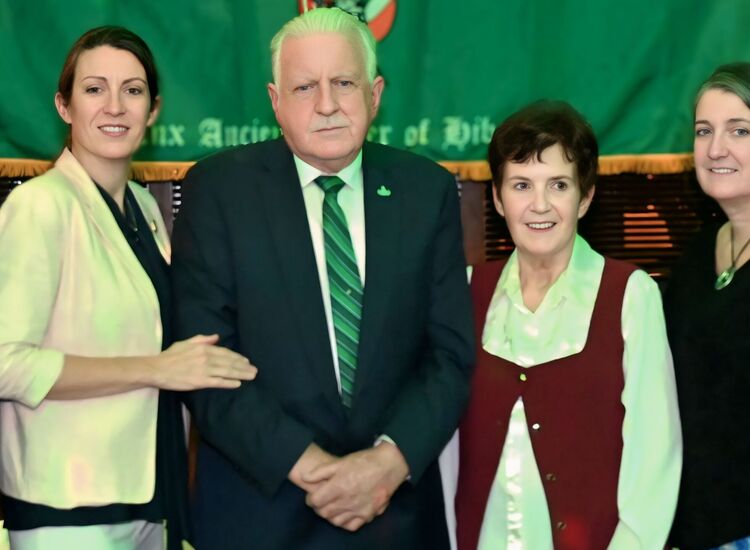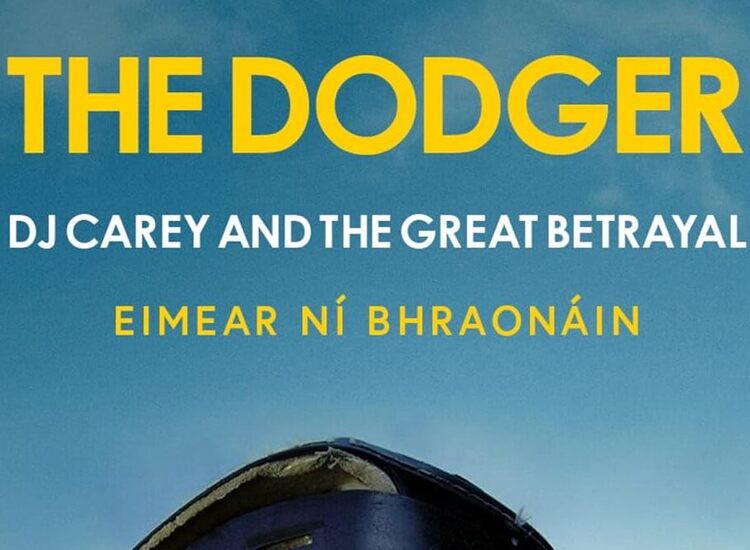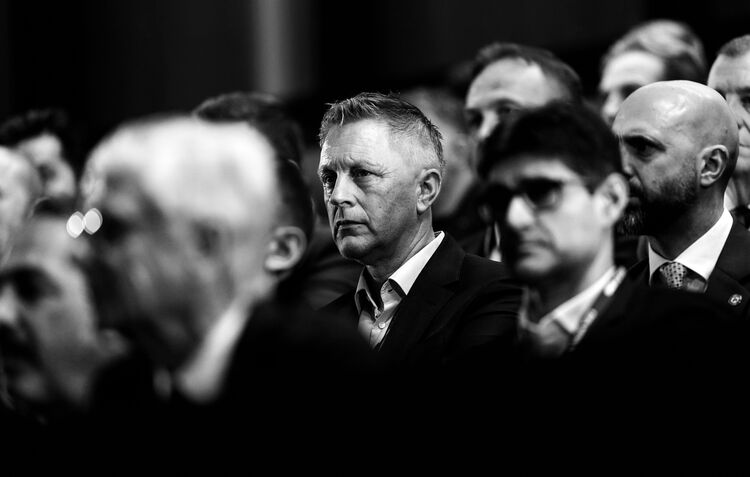[caption id="attachment_68820" align="aligncenter" width="600" caption="Earle Hitchner with his feline muse, Mazek."]
This is my last “Ceol” column for the Irish Echo and the last time I’ll be writing for it.
Before I came to the Irish Echo, I had established for a different Irish-American newspaper what was probably the first-ever, full-page, weekly column on Irish traditional music. That column, “Sounds Irish,” ran from the summer of 1989 to the fall of 1991. I must have done something right, because the column I launched still appears there but under a different title with a different writer, who is a friend and trad enthusiast I admire.
I began at the Irish Echo in December 1991, and I end with this last issue of December 2011. It has been a full, fruitful, memorable 20 years of chronicling my deep passion for the best in Irish traditional music for discerning, devoted readers – you.
I thank Tom Connelly, former editor in chief of the Irish Echo, for welcoming me to its pages in December 1991 and for allowing me to jump from weekly reviews and articles to a weekly, full-page, frequently multi-page column called “Ceol.” I hope it proved worthy of his trust in me. I also thank Eileen Murphy, former arts editor and art director of the Irish Echo, for her deft handling of my weekly submissions over the past two decades. Both Tom and Eileen intuitively understood what I was trying to achieve in my writing about Irish traditional music and gave me the freedom to do so. I am in their debt.
About 1,100 reviews, profiles, articles, and “Ceol” columns have appeared under my byline or with my tag in the Irish Echo. I am particularly proud of the past few years when I felt I was writing at my peak for this newspaper. Only a small handful of the 1,100 pieces would I revise or refine retroactively. Such second-guessing is the occupational hazard of journalism, defined by Matthew Arnold as “literature in a hurry.”
It’s impossible for me to recount in this last column all the previous Irish Echo columns and other pieces that made a dramatic difference in my life. But if I were pressed to identify the most significant of all, it would be my cumulative and especially early writing about button accordionist Joe Derrane. I have had the pleasure and privilege of meeting and interviewing many brilliant musicians, Irish or otherwise, but only twice in my life have I met in the flesh a bona fide musical genius: Joe Derrane and jazz saxophonist Sonny Rollins. The humility displayed by these two titans about their art provided me with a profound insight into what drives a great musician to excel and then to exceed his or her own expectation. Their musical standard is the highest of all: self-imposed.
I suspect that many years from now, my chief if not sole legacy as a music writer will be how I convinced Joe Derrane to return to the button accordion and Irish traditional music after a 35-year gap. It started innocently enough in the fall of 1993 with my brief phone call to him in Randolph, Mass., which set up my next phone call lasting more than four hours. Halfway through that long interview, I was convinced--without ever seeing then 63-year-old retiree Joe Derrane play the button accordion--that he still had the fire inside to perform on the D/C# box again. The next day, I called Mike Denney, director of the Washington, D.C., Irish Folk Festival, to ask him to invite Joe Derrane to perform there in 1994. Mike said he would on one condition: that I take full responsibility for Joe that day. I was happy to oblige, and on May 29, 1994, 64-year-old Joe Derrane, after a few months of intense woodshedding, began the most miraculous second act of any musician’s life I can think of. It remains my proudest moment in music.
Between 1991 and 2011 in the Irish Echo, I wrote glowingly about seven Irish traditional performers who during that period received the United States’ highest honor for a traditional or folk artist: the National Endowment for the Arts National Heritage Fellowship. They are Jack Coen (1991), Liz Carroll (1994), Donny Golden (1995), Mick Moloney (1999), Kevin Burke (2002), Joe Derrane (2004), and Mike Rafferty (2010). At the invitation of First Lady Hillary Clinton and NEA Chair Jane Alexander, I attended the awards ceremony for Golden in the White House, and at the invitations of NEA Chairs Dana Gioia and Rocco Landesman, I attended the awards ceremonies for Derrane and Rafferty in the U.S. Library of Congress. Seeing how emotional then 74-year-old Joe Derrane and 83-year-old Mike Rafferty became during the ceremonies will never leave my memory. And I will miss my annual badgering of the NEA to honor more Irish traditional artists in the future, such as the eminently deserving Seamus Connolly and Billy McComiskey.
Death depleted me several times during my two decades at the Irish Echo, which gave me the consoling space to write about the loss of my father, my mother, my nephew Jason, Seamus Connolly’s wife Sandy Walter, Joe Derrane’s wife Anne, Joe Madden, Mike Rafferty, and Johnny Cunningham. The last line in Mary Oliver’s poem “When Death Comes” floods back to me: “I don’t want to end up simply having visited this world.” None of those I cited did. I miss them all.
The strongest reaction I’ve ever received to any single “Ceol” column, however, was the sudden surge of messages sent to my personal e-mail address after I wrote “The Wild, the Innocent, and the Sig Phi Shuffle” column for the June 29, 2011, issue. In it I focused on recently deceased Clarence Clemons, a cornerstone of Bruce Springsteen’s E Street Band, and described his impact on my college friends and me in my hometown of Philadelphia. I was gratified but also a little startled that a highly personal take on rock, rhythm-and-blues, and soul in my trad column would strike a resounding chord in so many. Certainly, reconnecting with people I remember and who still remember me from Philly was an unexpected dividend. La Salle University, my alma mater there, even listed the column on its website, where it sparked further e-mails to me.
In my 20 years at the Irish Echo, I never wrote “down” to you, my readers. I have too much respect for you to deliver diluted content, and I abhor staid or slipshod prose. “Sloppy writing is the sign of a sloppy mind,” my high-school freshman English teacher drilled into me.
A number of journalists write according to how they’re paid, giving less effort for less money. I can’t do that. The reason is simple: my professional reputation rests on all my professional writing.
If “all art constantly aspires towards the condition of music,” as Walter Pater asserted, then all writing about music should constantly aspire towards capturing some of that “condition” in prose style. One of the biggest failings in music journalists, apart from muddleheaded metaphors and mutilated grammar, is their inability or refusal to impart music through the actual choice and arrangement of words used to describe or critique it. Music contains meter, tone, and tempo, and so does writing at its most effective and persuasive. Why divorce them? Dull diction, sagging syntax, and clanking clichés hardly mirror the beauty of well-wrought music.
The best compliment I ever received about “Ceol” came from one of you: “When you write about Irish music, Earle, I can hear it.”
Though flattered, I was still aware that on occasion I missed the mark. When I did, one of you rightly informed me.
People become newspaper music critics for two basic reasons: (1) to share their love for music with as many people as they can, and (2) to do a better job than most of the journalists already covering music. Both goals are laudable. But what matters in the end is whether readers agree the critics attained them.
I was blessed with exemplary readers at the Irish Echo. Knowing you were out there scrutinizing my work motivated me to maintain my own self-imposed standard. Whenever I hit the target I intended, I was pleased in the hope you were too. Whenever I stumbled, I would wince because I thought you would too. From 1991 to 2011, I served only one master at the Irish Echo: you.
Always insist on the best possible writing about Irish traditional music, the luster of which too often has been dimmed by trite or tortured prose. Like jazz, Irish traditional music deserves coverage commensurate with its splendor. Don’t settle for anything less--ever.
As for my own immediate future, I plan to immerse myself in my dissertation so that I can finish it, receive my doctorate, and attempt to teach again at a university or college. I know what I’m up against: an estimated half of all recent doctorate holders in the humanities can’t find jobs in academia. They’ve been dubbed the lost generation of scholars. But I love to teach on the college level, and the evaluations I’ve received as an instructor at Penn, Drew, CUNY Lehman College, and elsewhere confirm I’m good at it. I bring to the classroom the same dedication and dynamism that I brought to my “Ceol” column. With luck, I hope I’ll get an offer to teach in college again this fall.
My writing about music and other subjects for periodicals will not end with this ending “Ceol” column. Once I obtain my doctorate, I also hope to write a book or two, drawing from my liner essays for 67 albums, scholarly lectures and articles, contributions to music reference books, and more newspaper, magazine, and journal pieces than I can recall now. I will always write, and, like my musical heroes, I will always strive to exceed my own expectation.
Farewell, loyal readers of “Ceol.” I owe you a debt of gratitude beyond words. I will miss you. If any of you want to contact me directly, you can e-mail me at ehitch2@netzero.net.








